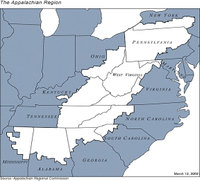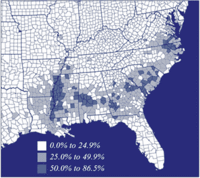Around the time of the last generational crisis, in the 1960s, there was a lot of talk about Appalachia, the mountain hollows running from north Georgia up to Maine, and especially that portion in the South.
Appalachia had resisted all attempts to bring it prosperity. Places last western Virginia, West Virginia, eastern Tennessee and western North Carolina were as poor as they had ever been. There seemed to be no solution.
But there was a solution, right around the corner. These are now "the mountains," that fabled far-away magical land where lowlanders dream of retiring to. This is now the east’s vacationland, an alternative to the beach, where rafting and hiking and mountain biking rule the summers, and skiing the winters. The resort and retirement economies have transformed these areas into, if not greater prosperity spheres, at least something resembling the rest of America.
But a new Appalachia has developed in our time. It’s the river bottoms, the swamplands, the vast middle between the mountains and the seacoast. Millions of people live there, in grinding lives of poverty or of faded wealth. And it’s getting worse.
The farm economy that once sustained these areas has collapsed. The
factories that once dotted the landscape have moved overseas. Much of
the land now consists of tree farms, and the people who are left are
steadily losing ground.
The biggest difference between today’s Appalachia and yesterday’s is
more stark, however. It’s the color of the victims. (That’s the point of the chart at left, from the Knight Foundation.) Because in the
South, the new Appalachia is often the "black belt," land share-cropped
for some generations, then lost to the trees.
Black folks dominate demographically in many of these areas — western Mississippi, southern Alabama, central Georgia, the low country of the
Carolinas. They don’t own the land, they’re a minority within their
states, and the politics of these places seems dedicated mainly to
keeping them down. The South remains a racist hotbed, the difference
today being that it’s Republicans who practice it, and it’s more
subtle.
There are all sorts of tricks being played to deny black people
control of government in these regions — gerrymandering, voter ID
laws, restrictive registration. There are some black officeholders —
mayors and legislators — throughout the region, but most are either on
the take or more interested in keeping what they have than getting
anything more.
Why should you care? It’s because where people are poor the
environment suffers, and these lowland environments are crucial to
cleaning our water, recharging our aquifers, and putting oxygen into
our air. The tree farmers are selling the land to developers.
Here’s another reason. This new Appalachia is expanding. America the
prosperous is actually contracting, becoming a mix of urban-suburban
mega-centers filled with colleges and creativity, and vacation areas
filled with part-time and retired residents or resorts. If you’re not
attracting the creative, and you’re not pretty as a postcard, your part
of the world is declining.
The new Appalachia, in other words, could easily be your hometown, and you owe it to yourself to turn the trend around.












